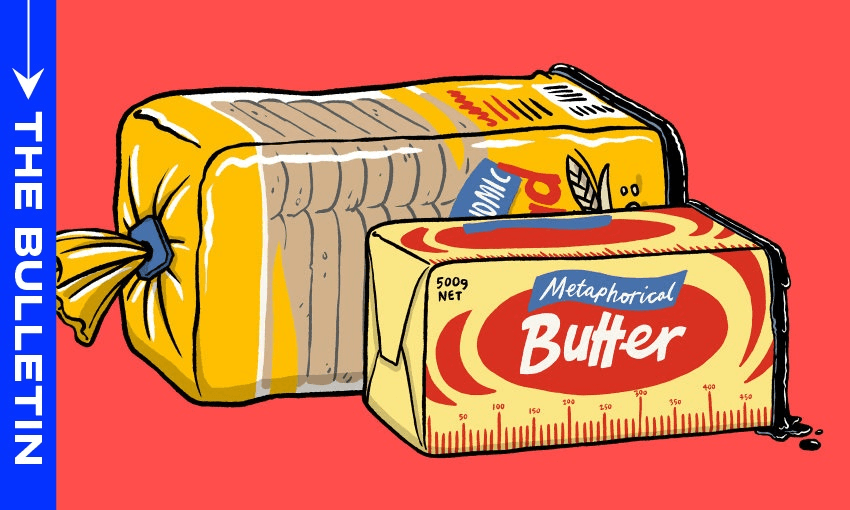The butter price crisis prompted a high-profile meeting at the Beehive – but global markets, not politicians, are still calling the shots, writes Catherine McGregor in today’s extract from The Bulletin.
To receive The Bulletin in full each weekday, sign up here.
Was the butter meeting a damp squib?
Finance minister Nicola Willis says she was surprised by “the almost breathless excitement” around her Tuesday evening meeting with Fonterra chief executive Miles Hurrell, reflecting a week of coverage perhaps more suited to a major sporting event than a wonky meeting about dairy economics. The Post dubbed it “the butter meeting heard round the country” while news sites ran red breaking news banners as Hurrell and Willis sat down to talk. With 500g blocks of butter topping $11 in some supermarkets, the stakes, at least symbolically, were high.
Willis said the conversation covered many topics, but she did ask Hurrell to clarify how butter is priced and why New Zealanders often pay more than overseas consumers. The main outcome, according to the Herald’s Thomas Coughlan? A suggestion that Hurrell will publicly explain the breakdown of butter pricing later this week. “He was so good at communicating about [butter prices], I have encouraged him to provide that information to New Zealanders,” Willis said.
Labour smells spin
The political optics of the meeting have raised eyebrows, particularly given Willis’s own six-year stint in senior roles at Fonterra, reports Bridie Witton in Stuff. Labour’s finance spokesperson Barbara Edmonds questioned whether the meeting was more about performance than policy, arguing Willis should already understand how butter is priced. Willis pushed back, saying she worked in government relations and environmental strategy – not pricing – and refused to “pre-judge” Fonterra’s explanations. Her office also noted she meets with the dairy giant regularly, and the discussion this week wasn’t solely about butter.
Still, the intense buildup and media framing gave the impression of a high-level intervention, when in fact the levers to influence pricing remain limited. “The lesson here is that performance politics doesn’t work,” Newstalk ZB’s Heather du Plessis-Allan said. “In fact … it runs the risk of backfiring, which is exactly what’s happening here.”
So why is butter so expensive?
As Blayne Slabbert explains in The Press (paywalled), 95% of our dairy products are exported and domestic prices reflect what those products earn overseas – a model known as export parity pricing. Recent Stats NZ data shows butter prices, driven by the global market, have surged 46.5% in a year, reaching an average of $8.60 per 500g.
While world dairy prices dipped slightly in July, they remain far above historical levels. Global supply is tight, and demand – especially in China and Southeast Asia – continues to climb. “You get to the situation we’re in now where butter is at extraordinary heights and everyone wants their butter on toast,” High Ground Dairy consultant Stu Davison tells Newstalk ZB’s Michael Sergel. “We don’t see it running right back to where we were five years ago.” That international appetite for grass-fed butter benefits our farmers and boosts export revenues, but leaves local consumers squeezed at the checkout.
A changing role for Fonterra
As butter becomes a lightning rod for public frustration at the cost of groceries, Fonterra may soon exit the retail fray altogether. The co-operative plans to sell off consumer-facing brands like Anchor and Mainland, focusing instead on its business-to-business operations. Writing in The Conversation, agribusiness professors Alan Renwick and David Dean say the move makes commercial sense. While some fear an overseas owner could lead to higher prices for consumers, they think it could help disrupt the current “cosy” relationship between Fonterra and the supermarkets – potentially even bringing prices down.
In the Herald, Clive Elliott, a barrister specialising in intellectual property, argues that the sell-off is a strategic error. “Our prosperity and ability to remain a first-world economy depends on our ability to add value,” Elliott warns, arguing Fonterra is abandoning decades of brand equity. Regardless of who ends up owning the dairy brands, the butter pricing system is unlikely to shift dramatically. For now, New Zealanders will have to settle for an unsatisfying explanation rather than meaningfully lower costs.
Related from The Spinoff:
Subscribe to NameEmailSubscribe

